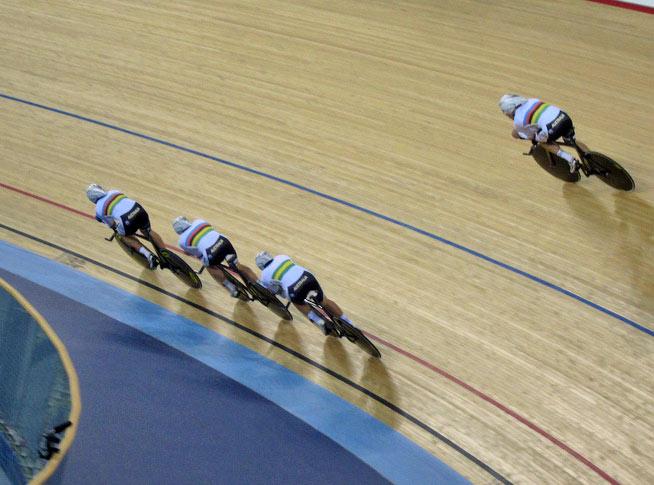Sport can be a tough world. Imagine working for 12 years at a job, 12 hours a day, 7 days a week – sacrificing diet, and all the usual conveniences of life. But after those 12 years of work, the end result is only a perceived failure with no pension or pay off. A sense of not just failing, but letting down those who have supported you – and a few clever people saying why didn’t you do better into the bargain.
At the 2012 London Olympics, there are 10,000+ athletes and 302 gold medal disciplines available. (though for team sports more athletes will be awarded a gold medal.) But, that’s still a pretty low ratio of gold medallists.
For these 10,000 athletes who made the Olympics, there are another 100,000+ who would have been close to qualifying for the Olympics. And potentially millions who would have had some kind of aspiration to compete at the Olympics, but couldn’t make it.
The odds of Olympic gold are minuscule. The odds of any kind of Olympic medal are only slightly less limited.
The immortal creed of the Olympics is that
“The most important thing in the Olympic Games is not to win but to take part, just as the most important thing in life is not the triumph but the struggle. The essential thing is not to have conquered but to have fought well.”
Yet, the great paradox of the Olympics is that winning does count, it does matter. It is the focus of the fours years of dedication and commitment.
Expectations
When Iceland got silver in the handball in 2008, the Iceland’s president called their semi-final win over Spain:
“the biggest moment in Icelandic sports history”. (BBC)
If you get a silver medal for Great Britain in this 2012 Olympics, you could find yourself squeezed into page 4 of the Olympic supplement – behind even more illustrious gold medal winners.
If it is not expected, winning bronze can be perceived as a tremendous achievement. Sometimes, if you’re expected to win, winning bronze medal is seen as something of a failure.
Expectation changes everything.
But, what of those who finish 4th?
Taylor Phinney sacrificed his 2012 road season to focus on the Olympics, he finished 4th in the Olympic road race only to finish 4th in the Olympic time trial a few days later. Is he happy to do so well? – knowing that he is still young in cycling terms (22) and that at the next Olympics he can do even better. Or does he feel frustrated at just missing out? – 4th the supposed worse place to finish. Perhaps he feels a bit of both.
4th man in the Team
Perhaps more difficult than finishing 4th place, is being 4th man (reserve) in a team discipline and missing out on gold medal only because you weren’t picked.
The reserves in the British team pursuit (Wendy Houvenghal and Andy Tennant) had to watch as their team-mates rode to world record breaking Olympic gold. But, for a different team selection they knew they would have been there with pretty much the same result.
To be part of an Olympic gold medal team should be a pinnacle of your sporting achievement. Do you feel oneness with the team and feel part of the success, or is it the loneliest place? Can you feel part of the success? or is it an opportunity denied?
Jimmy Greaves (who was England’s best striker, but not picked for the 1966 world cups due to injury) admitted he felt a huge range of conflicting emotions as his substitute Sir Geoff Hurst hit a hat rick to help England win the World Cup. The whole nation celebrated, but he was sat on the sidelines – not part of the winning team. It can be a lonely place sport.
It is a real challenge to feel a complete identity with the winning team members. But, what of the support staff, the coaches, the mechanics and support crew. There is no medal for them, but they often seem to get as much joy as the athletes themselves.
It maybe very hard to be reserve, but there is still the experience of being a key member of the team who trained and pushed the other riders. To be a reserve still gives the opportunity to be an Olympian and key team member that others may have loved the chance.
Difficult to Win
It can be even difficult to win. If you win too much or by too far, eyebrows are raised. (What shape are your wheels?) If you frequently win, winning can become an expectation. If you slip into second, you failed. If you win – just expectation fulfilled.
But, you never have to take the cynics approach, you don’t have to listen to bored teenagers writing on twitter-net . Whatever people say, you can celebrate your achievement however you want.
4th Placed is Good.
Amidst all the Olympic glory, I identify more with 4th placed riders than the gold medallists. In national championships my best placings are:
4th (2005 national 100 mile TT)
4th (2010 national hill climb)
5th (2011 national hill climb.)
I know what it feels like to finish 4th, I don’t know what it feels like to win a medal. I don’t know why people say 4th is the worse place to finish. To me 4th is better than 5th or 6th.
It is quite easy to talk of detachment and memorise the immortal words of the Olympic motto. It’s more difficult to live it.
Winning matters, and it doesn’t matter. That’s the beauty of sport.
There isn’t just the physical sporting challenge, but also the attitude to winning and losing which is often just as difficult. But, those who can accept defeat graciously are real heroes.
“The high spirit of sportsmanship and generosity manifested throughout speaks volumes for the character of the officers of the present day. There was not a single incident of a protest or any unsportsmanlike quibbling or fighting for points which I may say, marred some of the other civilian competitions at the Olympic Games. Each man did his best and took what fortune sent them like a true soldier, and at the end we all felt more like good friends and comrades than rivals in a severe competition, yet this spirit of friendship in no manner detracted from the zeal with which all strove for success.”
General Patton (1912 after competing in modern pentathlon) then reserved for army officers.


Really interesting thoughts! I’m reminded of two chains of thoughts I’ve been having recently:
1) For spectators – or supporters – the common experience is losing rather than winning. The majority of football teams lose more matches than they win. For the supporters of these clubs, losing is the common experience. Northampton Town, where I’m a season ticket holder, lose more matches than they win. So that, when they do win spectacularly on the very odd occasion, the supporter savours the moment – winning at Wembley in 1997 in the play-off final of the bottom division; defeating Liverpool at Anfield on penalties in the League Cup in 2010. These experiences make the regular experiences of losing worthwhile. And the committed supporter keeps going – wouldn’t it be terrible if you missed an “I was there when …” moment?
2) The Olympics are now over-blown. So (a) Erect a small permanent site. Greece would seem eminently suitable. And (b) Limit the competition to running, throwing and jumping. If results depend on “judging for artistic merit”, then Scottish Highland Dancing might as well be an Olympic sport!
Kudos for being a loyal supporter of Northampton Town. Definitely good to he philosophical when supporting Northampton.
When I was mad keen on cricket ,England always lost in 1980s.
When I mad keen on rugby league, Leeds never won anything.
It’s only when I lost interest, they started winning.
2) I don’t know. Scottish Highland Dancing may give us a good chance of another gold medal
Hi,
Interesting comments, specially coming from an athlete. There is a lot of obsession, between the spectators at least, with medals, with the achievement of medals. i don’t know to what extent the athletes are influenced by that and to what extent their respective federations urge them to win a medal.
I know of many people who don’t even enjoy the Olympics event because they are obsessed with medals and only feel ‘good’ when a new one is achieved.
I don’t think it’s necessary to explain why this approach is wrong. it deprives the spectators of fully enjoying the Olympics (let alone enjoying the performances by athletes or teams from other countries) and it’s a bit unfair and in my opinion it doesn’t match what this event really means: a supposedly absolutely sporting like event, a kind of an international sporting party, where besides just to be participating is a success in itself since as you say all of them have had to compete and qualify to get there. The best ones (except those injured) are there, all at once.
This said I understand and even appreciate (and to just some extent ‘demand’) that the athletes fight hard to get a medal or to get close to it.
I agree as well with you on the fact that finishing 4th is a great result. I just think that probably depending on the way the competition went, for instance if one finishes very very close to the third, it may make you feel some disappointment at the moment of finishing, but over the time of course it’s something to be proud of. In fact it is almost the same as finishing third.
And as far as I know the 4th position is awarded in the Olympics, as it is the 5th.. and up to the 8th, I think. I don’t think it was in the past, I am not sure.
Regards
Interesting points.
I know some athletes even find it difficult to be happy winning!
Nice article.
I believe your last sentence is not intended to read as it does: ‘But, those who can’t accept defeat graciously are real heroes.’ Surely it should read ‘CAN’?
Another one for correction: ‘Winning matters, and it it…’
thanks have updated